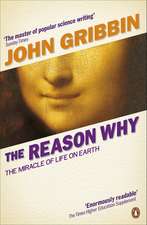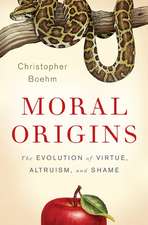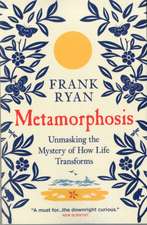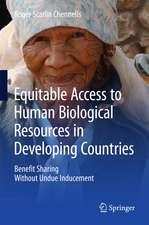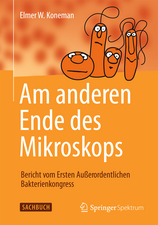Environmental History in the Making: Volume I: Explaining: Environmental History, cartea 6
Editat de Estelita Vaz, Cristina Joanaz de Melo, Lígia M. Costa Pintoen Limba Engleză Hardback – 24 oct 2016
Considering that political ideologies such as socialism and capitalism, as well as religion, fail to offer global paradigms for common ground, an environmentally positive discourse instead of an ecological determinism might serve as an umbrella common language to overcome blocking factors, real or invented, and avoid repeating ecological loss.
Therefore, agency, environmental speech and historical research are urgently needed inorder to sustain environmental paradigms and overcome political, cultural an economic interests in the public arena.
This book intertwines reflections on our bonds with landscapes, processes of natural and scientific transfer across the globe, the changing of ecosystems, the way in which scientific knowledge has historically both accelerated destruction and allowed a better distribution of vital resources or as it, in today’s world, can offer alternatives that avoid harming those same vital natural resources: water, soil and air. In addition, it shows the relevance of cultural factors both in the taming of nature in favor of human comfort and in the role of the environment matters in the forging of cultural identities, which cannot be detached from technical intervention in the world.
In short, the book firstly studies the past, approaching it as a data set of how the environment has shaped culture, secondly seeks to understand the present, and thirdly assesses future perspectives: what to keep, what to change, and what to dream anew, considering that conventional solutions have not sufficed to protect life on our planet.
| Toate formatele și edițiile | Preț | Express |
|---|---|---|
| Paperback (2) | 948.16 lei 6-8 săpt. | |
| Springer International Publishing – 27 iun 2018 | 948.16 lei 6-8 săpt. | |
| Springer International Publishing – 7 iul 2018 | 949.10 lei 6-8 săpt. | |
| Hardback (2) | 954.14 lei 6-8 săpt. | |
| Springer International Publishing – 24 oct 2016 | 954.14 lei 6-8 săpt. | |
| Springer International Publishing – noi 2016 | 955.08 lei 6-8 săpt. |
Din seria Environmental History
-
 Preț: 128.54 lei
Preț: 128.54 lei -
 Preț: 170.50 lei
Preț: 170.50 lei -
 Preț: 85.24 lei
Preț: 85.24 lei - 15%
 Preț: 650.04 lei
Preț: 650.04 lei - 18%
 Preț: 957.13 lei
Preț: 957.13 lei -
 Preț: 383.51 lei
Preț: 383.51 lei - 18%
 Preț: 1105.19 lei
Preț: 1105.19 lei - 18%
 Preț: 949.42 lei
Preț: 949.42 lei - 18%
 Preț: 1004.19 lei
Preț: 1004.19 lei - 18%
 Preț: 957.62 lei
Preț: 957.62 lei - 18%
 Preț: 1399.43 lei
Preț: 1399.43 lei - 15%
 Preț: 707.46 lei
Preț: 707.46 lei - 18%
 Preț: 959.50 lei
Preț: 959.50 lei - 15%
 Preț: 663.79 lei
Preț: 663.79 lei - 18%
 Preț: 1004.00 lei
Preț: 1004.00 lei - 18%
 Preț: 979.70 lei
Preț: 979.70 lei - 24%
 Preț: 948.00 lei
Preț: 948.00 lei -
 Preț: 85.48 lei
Preț: 85.48 lei
Preț: 954.14 lei
Preț vechi: 1163.58 lei
-18% Nou
Puncte Express: 1431
Preț estimativ în valută:
182.60€ • 189.93$ • 150.74£
182.60€ • 189.93$ • 150.74£
Carte tipărită la comandă
Livrare economică 15-29 aprilie
Preluare comenzi: 021 569.72.76
Specificații
ISBN-13: 9783319410838
ISBN-10: 3319410830
Pagini: 374
Ilustrații: XIV, 357 p. 38 illus., 26 illus. in color.
Dimensiuni: 155 x 235 x 22 mm
Greutate: 0.69 kg
Ediția:1st ed. 2017
Editura: Springer International Publishing
Colecția Springer
Seria Environmental History
Locul publicării:Cham, Switzerland
ISBN-10: 3319410830
Pagini: 374
Ilustrații: XIV, 357 p. 38 illus., 26 illus. in color.
Dimensiuni: 155 x 235 x 22 mm
Greutate: 0.69 kg
Ediția:1st ed. 2017
Editura: Springer International Publishing
Colecția Springer
Seria Environmental History
Locul publicării:Cham, Switzerland
Cuprins
Introduction: Estelita Vaz et al.- 1. Approaches – (social bondage to maths, arts or socio-biology).- 2. Proposing – Concepts, sources, methodologies.- 3. Clarifying - Results – interchange of psico-social with natural and analytical.- 4. Blurring all confronting data : new interpretations, old themes, different outcomes.- 5. Resetting data, new data, new stories - information upon classic subjects (crossing methodologies new results).
Textul de pe ultima copertă
This book is the product of the 2nd World Conference on Environmental History, held in Guimarães, Portugal, in 2014. It gathers works by authors from the five continents, addressing concerns raised by past events so as to provide information to help manage the present and the future. It reveals how our cultural background and examples of past territorial intervention can help to combat political and cultural limitations through the common language of environmental benefits without disguising harmful past human interventions.
Considering that political ideologies such as socialism and capitalism, as well as religion, fail to offer global paradigms for common ground, an environmentally positive discourse instead of an ecological determinism might serve as an umbrella common language to overcome blocking factors, real or invented, and avoid repeating ecological loss.
Therefore, agency, environmental speech and historical research are urgently needed in order tosustain environmental paradigms and overcome political, cultural an economic interests in the public arena.
This book intertwines reflections on our bonds with landscapes, processes of natural and scientific transfer across the globe, the changing of ecosystems, the way in which scientific knowledge has historically both accelerated destruction and allowed a better distribution of vital resources or as it, in today’s world, can offer alternatives that avoid harming those same vital natural resources: water, soil and air. In addition, it shows the relevance of cultural factors both in the taming of nature in favor of human comfort and in the role of the environment matters in the forging of cultural identities, which cannot be detached from technical intervention in the world.
In short, the book firstly studies the past, approaching it as a data set of how the environment has shaped culture, secondly seeks to understand the present, and thirdly assesses future perspectives: what to keep, what to change, and what to dream anew, considering that conventional solutions have not sufficed to protect life on our planet.
Considering that political ideologies such as socialism and capitalism, as well as religion, fail to offer global paradigms for common ground, an environmentally positive discourse instead of an ecological determinism might serve as an umbrella common language to overcome blocking factors, real or invented, and avoid repeating ecological loss.
Therefore, agency, environmental speech and historical research are urgently needed in order tosustain environmental paradigms and overcome political, cultural an economic interests in the public arena.
This book intertwines reflections on our bonds with landscapes, processes of natural and scientific transfer across the globe, the changing of ecosystems, the way in which scientific knowledge has historically both accelerated destruction and allowed a better distribution of vital resources or as it, in today’s world, can offer alternatives that avoid harming those same vital natural resources: water, soil and air. In addition, it shows the relevance of cultural factors both in the taming of nature in favor of human comfort and in the role of the environment matters in the forging of cultural identities, which cannot be detached from technical intervention in the world.
In short, the book firstly studies the past, approaching it as a data set of how the environment has shaped culture, secondly seeks to understand the present, and thirdly assesses future perspectives: what to keep, what to change, and what to dream anew, considering that conventional solutions have not sufficed to protect life on our planet.
Caracteristici
Offers insights on the past environmental changes that sharpen reflections to understand the present as to dream and plan a better future? A multi-layered historical research crossing disciplines, methodologies and concepts from local to global scales Projects environmental history as an applied science building trust through past bad and good experiences to define policies reverting cultural and natural loss The most up-to-date academic outcome of experts on environmental history

